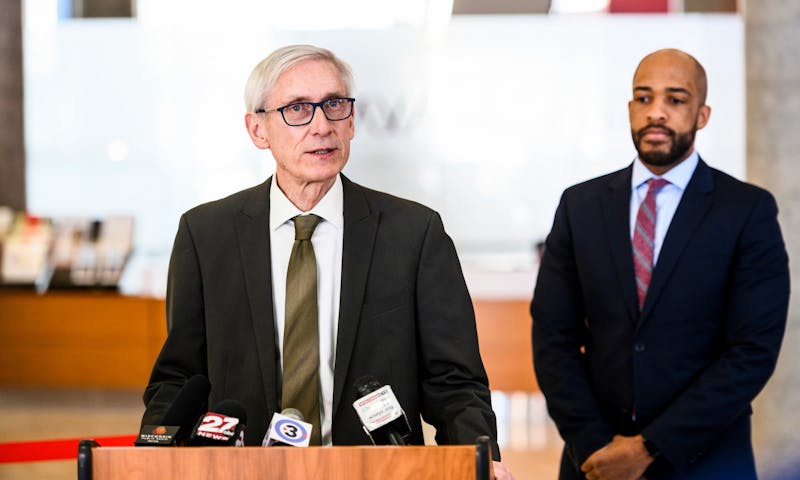
As Wisconsin grapples with the novel coronavirus, Gov. Tony Evers ordered for the state to continue with its Safer at Home order for another month.
Image By: Jeff Miller
As Wisconsin grapples with the novel coronavirus, Gov. Tony Evers ordered for the state to continue with its Safer at Home order for another month.
Image By: Jeff MillerGov. Tony Evers announced Thursday he would extend Wisconsin’s Safer at Home order until late May in order to contain the spread of the novel coronavirus.
Evers’ initial order intended to keep non-essential businesses closed until April 24. The new mandate will ease certain restrictions, but lengthen the deadline to May 26.
All public and private schools in Wisconsin will be shut down for the rest of the school year as well, keeping thousands of students home for almost three months.
“A few weeks ago, we had a pretty grim outlook for what COVID-19 could mean for our state, but because of the efforts of all of you, Safer at Home is working,” Evers said in a release. “That said, we aren’t out of the woods just yet.”
The updated guidelines allow golf courses to open and for public libraries to conduct curb-side pick-ups. Other non-essential businesses, such as arts and crafts stores, will be able to conduct “Minimum Basic Operations” — which includes deliveries, mailings and curb-side pick-ups — but they must notify employees if they are essential to their operations.
As the number of confirmed cases of the virus reached 3,875 with 197 deaths, public health officials called the extension as a necessary act to prevent the continued transmission of COVID-19.
“Before we lift Safer at Home, the steps of testing and more robust public health measures must be in place,” said Department of Human Services Secretary-Designee Andrea Palm. “These steps will help us reduce the risk of a second wave of the virus. If we open up too soon, we risk overwhelming our hospitals and requiring more drastic physical distancing measures again.”
Evers' plan followed moves by other Midwestern governors who chose or indicated they would extend their orders as well. Along with Illinois, Indiana, Kentucky, Michigan, Minnesota and Ohio, the seven states will collaborate in developing a plan to reopen their economies together, according to the Chicago Tribune.
However, Republican lawmakers and conservative critics who advocated for the state to loosen its restrictions criticized Evers' decision, asserting the “state’s health care system has not been overwhelmed with [COVID-19] cases,” the Milwaukee Journal-Sentinel reported.
“The whole idea was flattening the curve. Well, the curve has been flattened,” said Sen. Duey Stroebel, R-Cedarburg, in an interview with WTMJ. “Unfortunately, we’re seeing a lack of leadership from the governor as to what are the metrics (to reopen).”
Sen. Dan Feyen, R- Fond du Lac, also sent Evers a letter that proposed the creation of a task force to assist in deciding when the state would reopen its economy.
“Our constituents are scared, and rightfully so, for their families, their livelihoods and their communities,” Feyen wrote. “The longer we leave this economic moratorium in place, the smaller the number of businesses that will be able to emerge and operate on the other side.”
Opponents to the order are expected to hold a demonstration at the State Capitol on April 24, the original end date of the Safer at Home order, according to Channel 3000.
In contrast, public health officials attributed the state’s current measures as to why Wisconsin’s hospitals and clinics remain stable. Palm said Wisconsin has made progress in combating the virus, but public health officials will stay prepared in anticipation for an influx in new cases of the virus.
“As I’ve said all along, we are going to rely on the science and public health experts to guide us through this challenge,” Evers said. “So, as we extend Safer at Home, I need all of you to continue doing the good work you’ve been doing so we can keep our families, our neighbors, and our communities safe and get through this storm together.”